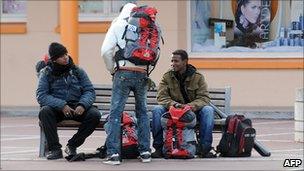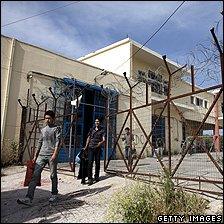EU-Pakistan deal sharpens debate on migrants
- Published

Last year France dispersed migrants in Calais who were hoping to reach the UK
Thousands of Afghan and Pakistani illegal migrants in Europe could be affected by new EU moves to tighten co-operation with major transit countries used by would-be immigrants.
The European Commission has negotiated a "readmission" agreement with Pakistan to standardise procedures for repatriating illegal migrants who travel to the 27-nation EU from Pakistan. It would include Afghan migrants who transit through Pakistan.
The UK, with one of the biggest Pakistani communities outside Pakistan, has opted into the agreement - despite the fact that it already has a bilateral immigration deal with Islamabad.
But the EU deal is under scrutiny in the European Parliament, which will vote on it in September. Some MEPs and human rights campaigners want clear safeguards in the agreement to ensure that deported migrants get fair treatment on their return to Pakistan.
Human rights 'respected'
The agreement is controversial because Pakistan has been struggling to accommodate hundreds of thousands of Afghan refugees and displaced Pakistanis, uprooted by the fighting with the Taliban.
Some MEPs have also highlighted the fact that Pakistan has not ratified the 1951 UN Convention on the status of refugees , external- a key international agreement defining refugees' rights.
The fear of al-Qaeda and Taliban attacks spreading to Europe - like the suicide bombings in London in 2005 - is giving impetus to the EU drive to identify illegal migrants from the region.

Greece has detained many Afghans trying to reach the EU from Turkey
The European Commission insists that readmission agreements "fully respect human rights and fundamental freedoms", whatever the security concerns.
The UK has opted into all 11 EU readmission agreements currently in force. They apply to: Russia, Sri Lanka, Hong Kong, Macau, Ukraine, Albania, Macedonia, Serbia, Montenegro, Bosnia‑Hercegovina and Moldova.
A key aim early on was to stop illegal migrants entering from the Balkans. The EU stick was balanced by a carrot for Balkan governments: the prospect of a smoother ride towards EU membership and the lifting of visa restrictions.
Now the EU is negotiating similar deals with several countries including China, Pakistan and Turkey - all problem areas because of the flow of illegal migrants to Europe.
The Pakistan agreement is supported by the centre-right European People's Party (EPP) - the parliament's biggest bloc.
Dutch MEP Wim van de Camp of the EPP said such EU-wide agreements acted as a "signal" to non-EU countries that they must take responsibility for their own citizens.
"If individual EU countries have their own policies then migrants move from the Netherlands to Germany and the whole circuit starts again. But this way we get a common asylum policy - it's one of the advantages of the European approach," he told the BBC.
Shifting population
But UK Labour MEP Claude Moraes rejects the Pakistan readmission agreement as it stands, like other MEPs in the centre-left Socialists and Democrats (S&D) group and the Greens.
For the first time, because of the Lisbon Treaty, the parliament can veto this and other readmission agreements.
"The Lisbon powers mean MEPs should put human rights first and ensure that long-term agreements with third countries stick," Mr Moraes told BBC News.
He called for a proper efficiency test on this and other readmission agreements, because migrants are often hard to track now in the EU, most of whose states are in the passport-free Schengen zone, where border controls are minimal, external.
He questioned the wisdom of having EU-wide agreements on such matters, pointing to the special ties binding the UK with Pakistan, a former colony.
But the UK "doesn't have much choice - it has to opt in, to get the best possible agreement", he said.
In the event of a conflict between the UK's agreement with Pakistan and the EU one, "the EU one takes precedence - the legal opinion on that is clear", he said.
Pooling EU resources
For decades the UK has seen immigration as a national - not EU - competence and the UK still has many opt-outs in the area of EU justice and home affairs.
But the UK is a magnet for many English-speaking migrants, including those from South Asia, and the British authorities want to stem the flow of illegal migrants transiting across the EU.
Makeshift, insanitary migrant camps such as "the jungle" sprang up just across the English Channel after French officials closed the Red Cross centre at Sangatte in 2002.
It is a principle of international law that refugees should not be returned to places where their lives or freedoms could be threatened - a principle called "non-refoulement".
The UN refugee agency, the UNHCR, says it is "concerned" that the current EU-Pakistan agreement "is not sufficient to ensure respect for the principle of non-refoulement".
The EU's statistics agency Eurostat says 15,575 Pakistanis were found to be illegally present in the EU in 2009, of whom 4,605 were sent back following an order to leave.
For Afghans the figures were 50,720 staying illegally and 6,715 returned in 2009.
The figures for both countries were higher than in 2008 - and they do not include illegal migrants who went undetected. Many migrants from Africa, China and the former Soviet Union also enter the EU illegally.
For the UK alone, the number of Afghans removed in 2009 was 1,180 and the number of Pakistanis 2,640, UK Home Office figures show.
A Home Office spokesman said "the advantage of a common EU approach is that member states would be required to adhere to common high standards, rather than following up to 27 potential bilateral arrangements (of varying levels of quality and detail)".
The human rights group Amnesty International is especially concerned about Italy's bilateral agreements with Greece and Libya, under which Italy "summarily hands over migrants without assessing their needs", Amnesty's Anneliese Baldaccini said.
But Ms Baldaccini, a migration expert, also criticised the EU-Pakistan agreement, saying Pakistan was already overburdened with migrants and "these returns don't seem sustainable in any way".
The risk is that migrants sent back will "re-enter the cycle of migration and make their way again to another country", she told the BBC.
- Published17 June 2010
- Published17 June 2010